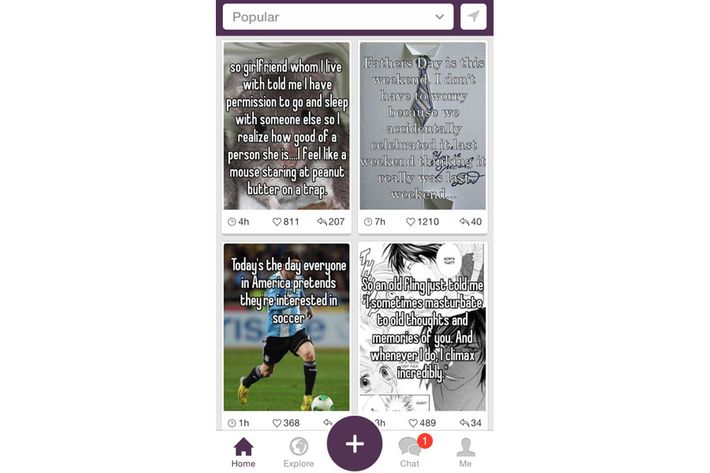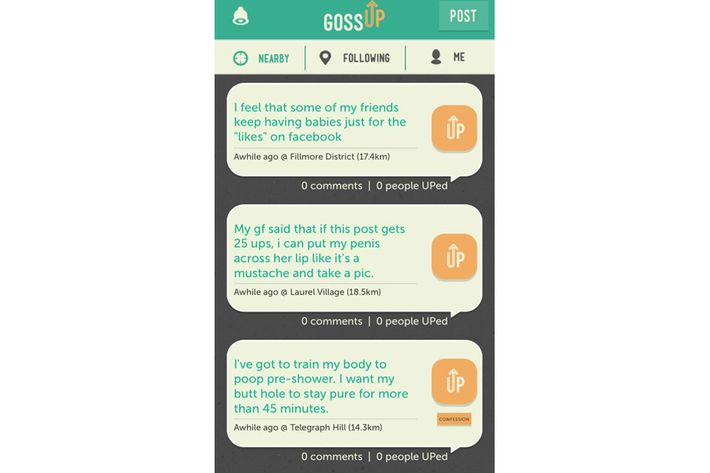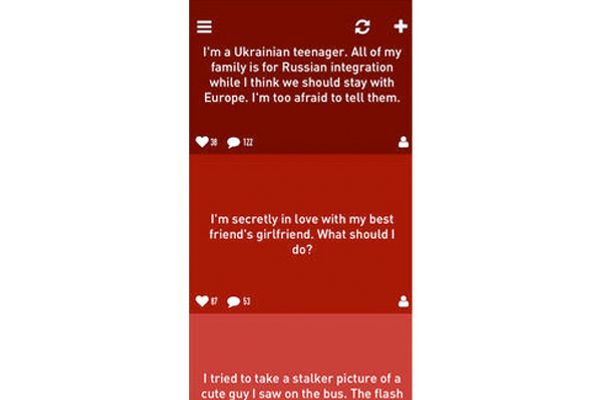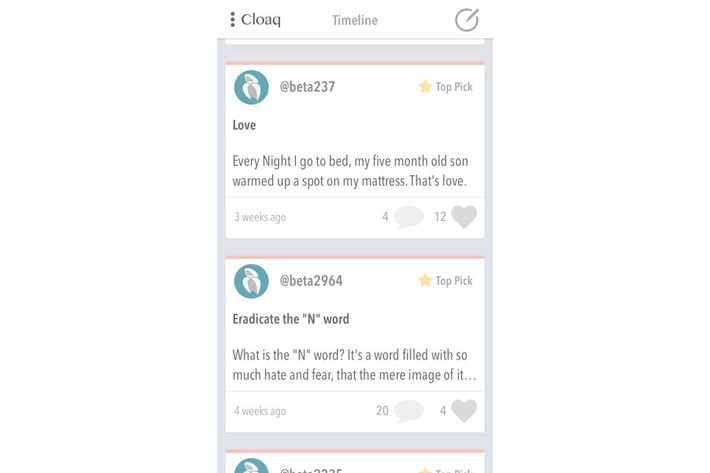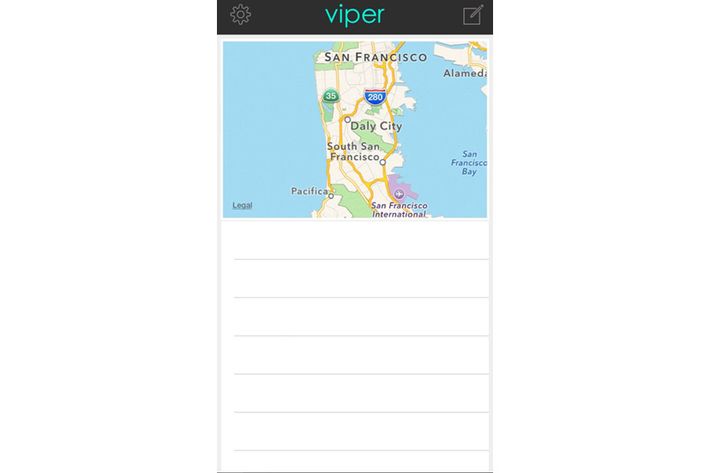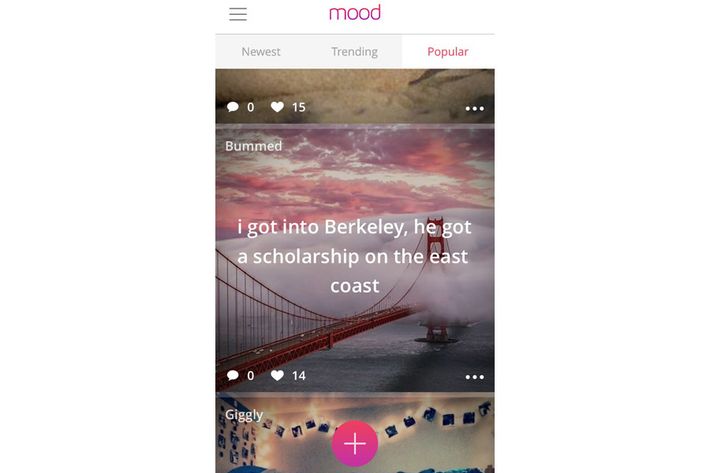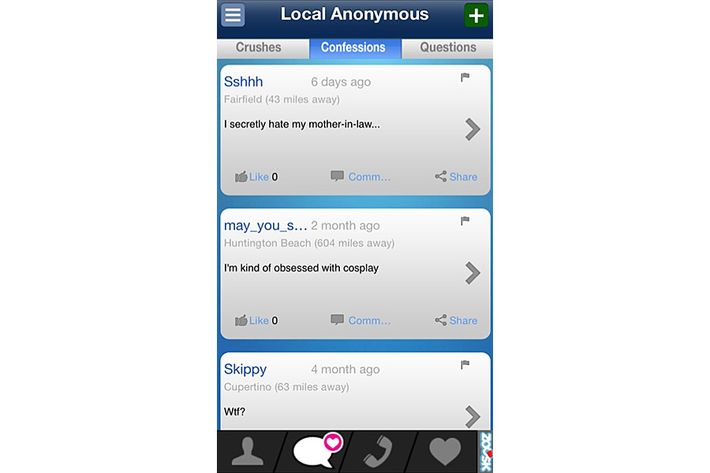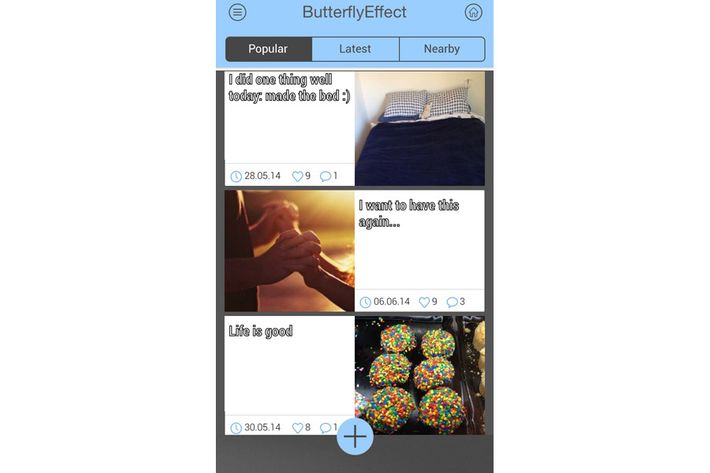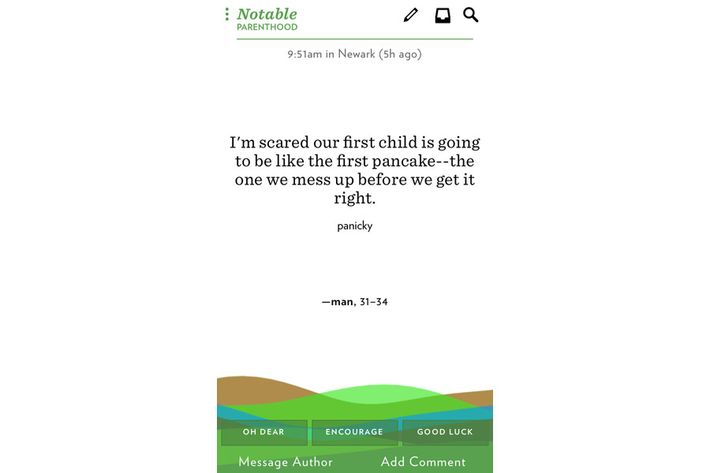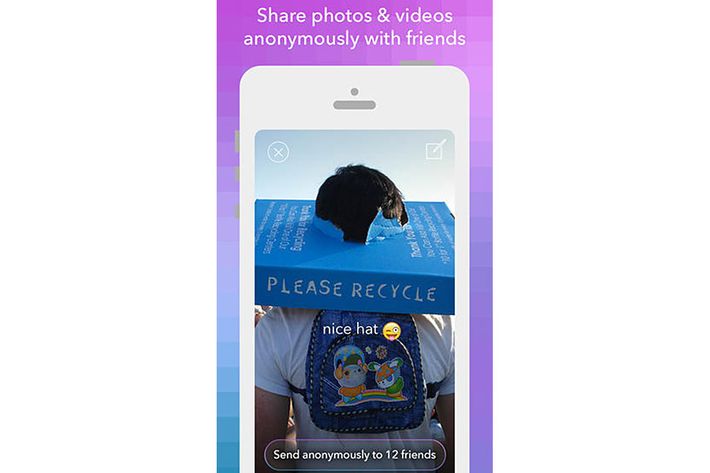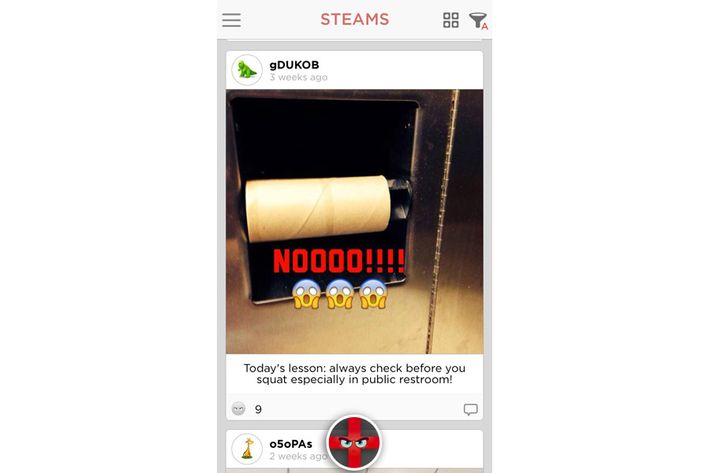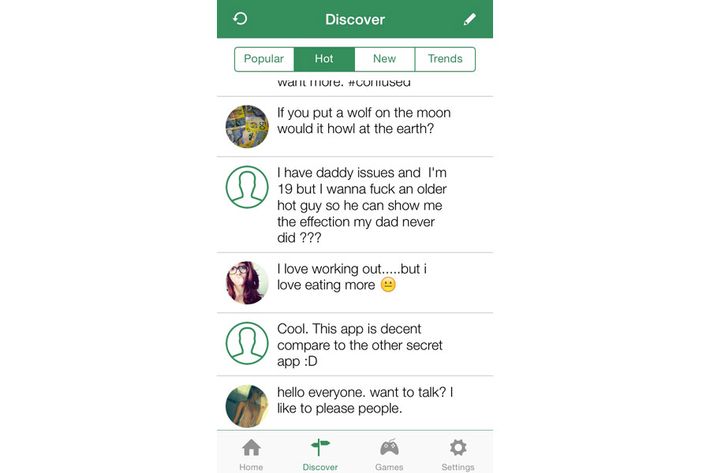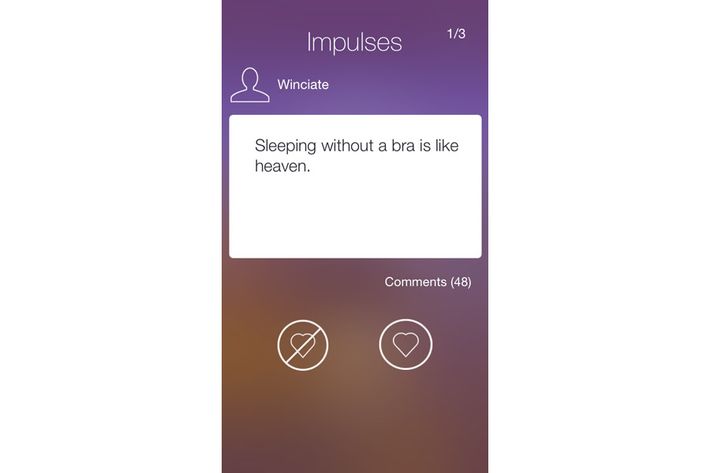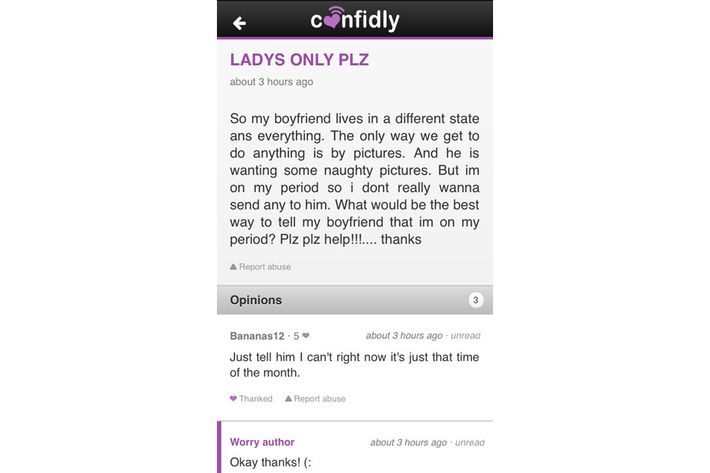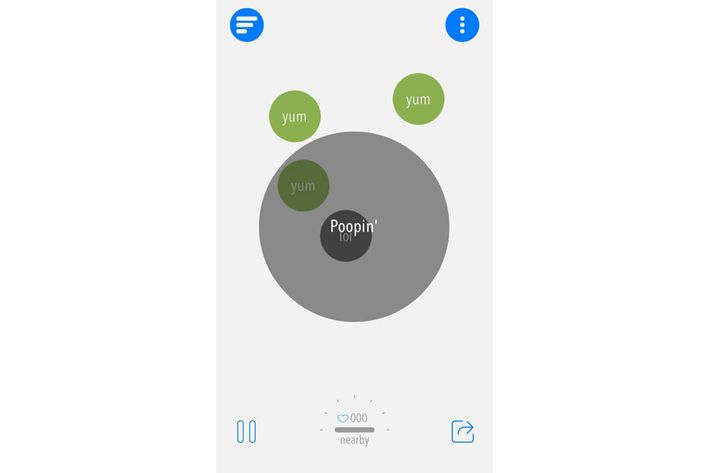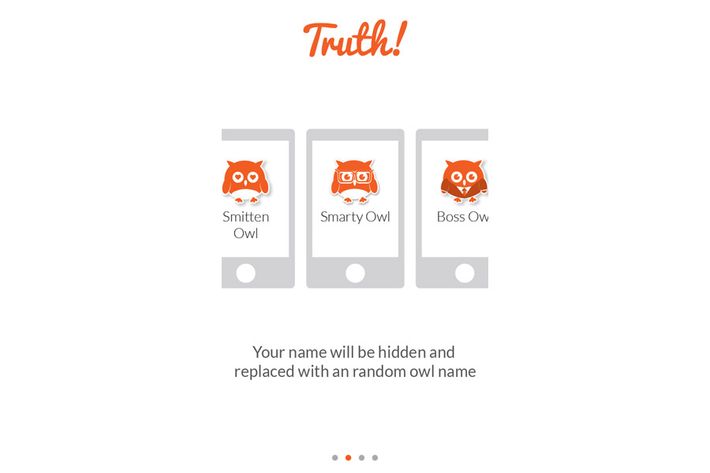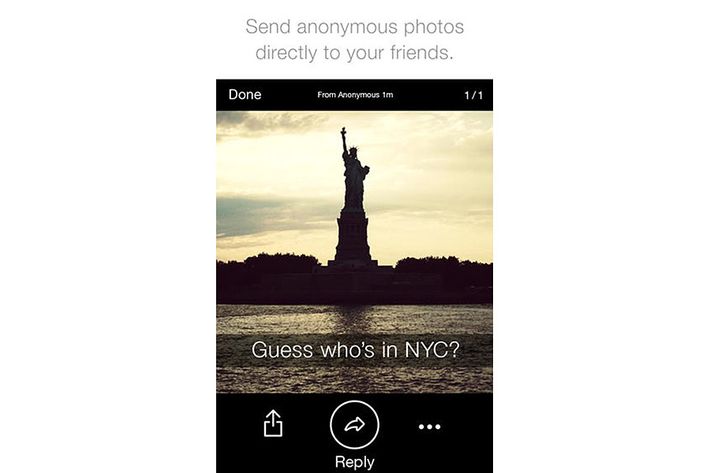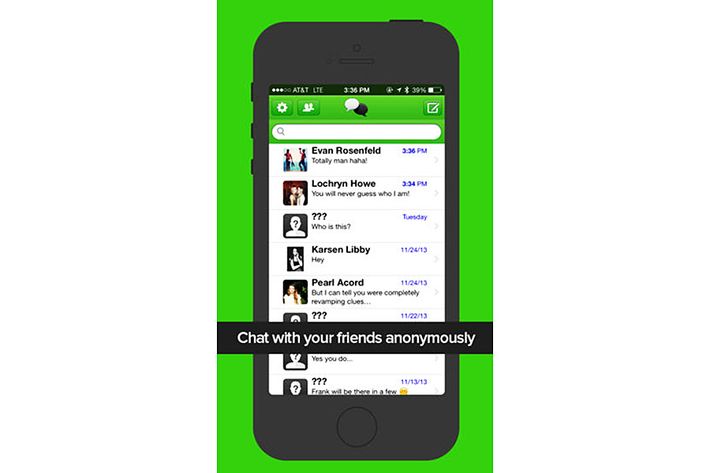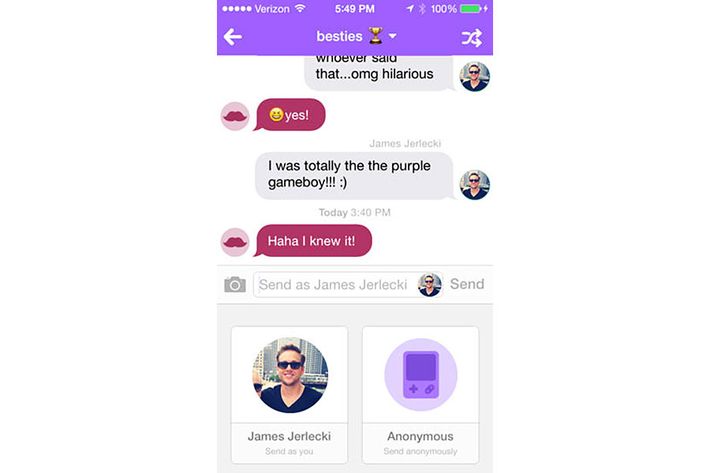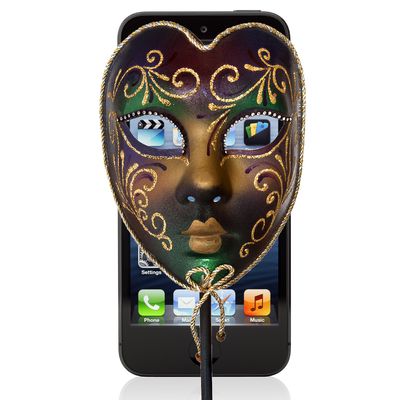
There was a time in internet history, not too long ago, when it looked like realness might prevail. Facebook pioneered the concept of single-identity networking — the idea that your online activity should be traceable to your real name — and legions of other companies jumped onboard. Real-world accountability would force us all to behave more responsibly online, they argued. The days of hiding behind pseudonymous usernames seemed numbered.
But a funny thing happened on the way to an authentic internet: Anonymity came back into vogue. Today, there are literally dozens of anonymous sharing apps that allow you to vent, confess, or share secrets with strangers while going incognito. These apps are so popular, in fact, that it’s hard to keep track of them all. In an attempt to catalogue the emerging trend, I downloaded 25 different anonymous apps to my phone — every one I could find on the App Store — and tested each one. Here’s the complete, exhaustive rundown:
Whisper
App Store description: “Whisper is the best place to express yourself online. Connect with likeminded individuals, and discover the unseen world around you.”
What makes it different: Whisper is the grandaddy of anonymous sharing apps. Since launching two years ago, it’s raised $60 million in funding, and is generating billions of page views a month. It’s huge among high school and college students, who use it to share personal confessions and random musings set on top of images.
Typical post: “When I got fired I signed my old boss up for tampon samples delivered to the office.”
Good for: teens, former PostSecret fans, Gwyneth Paltrow obsessives
Secret
App Store description: “Secret is a new way to share what you’re thinking and feeling with your friends.”
What makes it different: Started by two former Google employees, Secret is Silicon Valley’s favorite gossip rag. Posts can be seen by a user’s phone contacts or nearby users, and, so far, the crowd seems tech-heavy. Lots of posts about start-ups and San Francisco, with a sprinkling of sexual depravity.
Typical post: “If you or someone you know works at Uber, please share your experience.”
Good for: tech bloggers, disgruntled start-up workers, Bay Area fetishists
Yik Yak
App Store description: “Yik Yak acts like a local bulletin board for your area by showing the most recent posts from other users around you.”
What makes it different: Yik Yak is beloved by teenagers (and loathed by their teachers), who use it for all manner of anonymous shit-talking. Will Haskell wrote earlier this year about how Yik Yak’s text-only posts “brought [his] high school to a halt,” after messages like ““K. is a slut” and “The cheer team couldn’t get uglier” made their way onto the app.
Typical post: “Boobs are pretty cool.”
Good for: Bullies, popular kids, enemies of Goldman Sachs interns
Gossup
App Store description: “Gossup is social media unfiltered.”
What makes it different: It’s like Yik Yak plus Foursquare and Instagram, with a dash of Reddit. Users can post photos anonymously, follow the posts coming from certain locations, and earn “sway” by posting messages that are upvoted a lot.
Typical post: “Just realized I wore jeans to work today with puke from last night.”
Good for: nosy bargoers
Babbly
App Store description: “Share anonymously your thoughts with your friends! Babbly is a new way to express yourself and discover what the world around you is thinking. Create personalized groups or join existing ones to narrow down the people you are sharing with!”
What makes it different: Not much. I didn’t actually sign up for Babbly (it doesn’t have any reviews on the App Store, and I didn’t trust the app with my Facebook login information), but it seems to be a sloppier version of Secret, with added group-message functionality. The app’s description is very odd. Among its claims: “Your babbles will be published on a stunning instant timeline that’s been said to be as beautiful as The Mona Lisa herself!”
Typical post: “I’m secretly in love with my best friend’s girlfriend. What should I do?”
Good for: exclamation point fans, the overly trusting
Cloaq
App Store description: “Cloaq is the first place where who you really are on the inside and what you have to say is the only thing that exists to define you.”
What makes it different: Cloaq is possibly the most anonymous of the anonymous apps — you don’t even need a username or email address to sign up. Instead, new users are given a nondescript handle (like @beta999) and no personal data is shared with Cloaq at all. That way, if there’s a hack on Cloaq’s servers, your secrets are still safe. Also, unlike on Secret or Whisper, Cloaq allows posts of any length — so you can get that four-page sob story off your chest.
Typical post: “Do you believe in necessary evil?”
Good for: long-winded gossips, Edward Snowden
Viper
App Store description: “Ever feel like you’re not truly yourself online? Not anymore. Introducing viper.”
What makes it different: Viper is location-based. Users can anonymously post thoughts that are relevant to where they are — a college campus, a restaurant, a big concert. When they move away from the area, the post disappears.
Typical post: No idea — when I opened the Viper app, there was nobody sharing anything within five miles of me, so all I saw was a map and a blank area.
Good for: people who live within five miles of Viper’s headquarters
Insider
App Store description: “Insider is the place to chat anonymously about sports.”
What makes it different: It’s exactly like Secret, but all the posts are about sports.
Typical post: “Indiana Pacers are a joke.”
Good for: superfans who don’t know about SB Nation comment sections
Mood
App Store description: “Mood lets you express your true emotions and explore the inner thoughts of people in the same mood — all anonymously.”
What makes it different: Mood is a lot like Secret and Whisper, but posts are sorted into more than 100 “moods” (cheerful, giddy, sexy, inspired). You can browse by mood, or just look at what’s trending.
Typical post: “I think I might love him.”
Good for: mood ring nostalgics, adjective fans
Local Anonymous
App Store description: “Local Anonymous is a social network for everything private. Share all of your deepest secrets and become the talk of others.”
What makes it different: It’s ugly as hell. Also, nobody uses it. On the home screen, I saw a message from seven months ago. May or may not be a high school coding class project.
Typical post: “anyone use this app still?”
Good for: void-shouters, windmill-tilters, people with an affinity for mid-1990s web aesthetics
ButterflyEffect
App Store description: “ButterflyEffect is an anonymous community designed to allow users to share secrets, express gratitude and get inspiration. It is based on the premise that a single action, no matter how small, affects others in the world forever.”
What makes it different: In addition to a Whisper-like anonymous posting function, ButterflyEffect users can “give gratitude” (send thank-you notes to friends), “get inspiration” (view inspirational quotes from people like Thomas Edison and Audrey Hepburn), or post to a personal photo journal.
Typical post: “Do you ever wonder if your soul has a twin in another dimension?”
Good for: people who have Gandhi quotes in their email signatures
Matter
App Store description: “Connect candidly with other people in a safe, beautiful, and anonymous environment.”
What makes it different: Matter is the anonymous sharing app for literate adults – users can post thoughts on various topics, rate other users’ posts by tapping buttons like “support,” “value,” and “relate,” and subscribe to themed “communities” within the app (Veterans, Parenthood, LGBTQ, Love Troubles, etc). The app also provides writing prompts, such as: “What are the biggest obstacles in your way right now?” Posts tend to be interesting and earnest, and banality is refreshingly rare. One of the only apps on this list that grown-ups will feel comfortable using.
Typical post: “As my neighborhood goes from being gentrified to luxurified, the sidewalks are crowding with alpha males and females, sporty outfits, Type-A personalities and all the rest. Why do they bother me so much? Because I envy them? Or because I resemble them?!”
Good for: grad students, new parents, people with Medium blogs
Ether
App Store description: “There are no names, profiles or history. Just you, your friends, and real moments.”
What makes it different: Ether is exactly like Snapchat, but anonymous. Photo and video messages can be sent only to your friends, who won’t know that you sent them.
Typical post: [I have no idea. None of my friends are on Ether to send me messages.]
Good for: Snapchatters who fear being traced, dick-pic enthusiasts
Steams
App store description: “STEAMS is 100% anonymous social network that lets you to [sic] express your voice and concerns!”
What makes it different: It’s Whisper without the positivity. Steams says it’s meant to let users anonymously complain about “traffic jams, big lines, dirty roads, train delays, bad appraisals, war, violence, politics, crime.” Its mascot is a red, angry face with steam coming out of its nostrils.
Typical post: “Wish I was not stuck on earth … “
Good for: Debbie Downers
Bamtboo
App Store description: “Bamtboo is an anonymous social network that allows people to meet and share things they would on any other network but privately.”
What makes it different: Bamtboo is a kind of Twitter–Yik Yak mash-up. Users have photos, but not usernames or profiles connected to their real names. You can follow other users, repost others’ posts, or indicate favorite posts, just like in Twitter. You can also play games by yourself (but only two, Bamtboo Smasher and Drunken Genius, the latter of which is just a 10-question math quiz).
Typical post: “I love working out……but I love eating more :|”
Good for: Honestly, I have no idea who would use this app.
WUT
App Store description: “WUT is a new social app that lets you send anonymish, ephemeral messages to your all your Facebook friends.”
What makes it different: WUT bills itself as an “anonymish” app. When you send a message, it goes to all of your Facebook friends who use WUT. They’ll know it’s from someone they know (and may be able to field a guess about who it is), hence the “ish” part. But your name isn’t attached. And after your message is viewed on a recipient’s lock screen, it disappears. “Mostly, it’s just silly chat,” TechCrunch reports, between users who “want to be tethered to their friends constantly.”
Typical post: “[pizza emoji] [beer emoji] [thumbs-up emoji]”
Good for: lonely people
Impulses
App Store description: “Impulses is a new Social Network to say what you really feel or want.”
What makes it different: Not much. It’s essentially a bad Yik Yak clone.
Typical post: “I wish I could see 20 years into the future.”
Good for: people who have been banned from Yik Yak
ShareWhere
App Store description: “ShareWhere is a new way to anonymously express what’s on your mind and what’s happening at the places around you.”
What makes it different: It’s a lot like Gossup and Viper. Users can tie posts to places, and search for the posts closest to them.
Typical post: “The party here is out of control!”
Good for: people who are too shy to brag about their whereabouts on Instagram, but want to inspire FOMO in strangers
Confidly
App Store description: “Confidly helps you post your worries and share them anonymously. You will feel comfort when complete strangers all over the globe answer your worries and offer their caring advice.”
What makes it different: Confidly bills itself as the kinder, gentler anonymous app. Users are prompted to post their “worries,” and threaded message-board-style comments allow strangers to chime in with words of affirmation.
Typical post: “anorexic ppl r pretty”
Good for: People who should really be in therapy, frankly
Shrtwv
App Store description: “Anonymously share moments in time with the world around you one wave at a time. See what others have left behind and leave your mark by adding stickers and liking waves.”
What makes it different: The weirdest app of the bunch. Other users’ anonymous posts (called “waves”) appear on your screen and disappear seconds later; to comment, you drag one of several “stickers” onto a wave before it disappears. The stickers include a BuzzFeed-ian assortment of sentiments, including “aww,” “omg,” “yum,” “fail.”
Typical post: “Poopin”
Good for: people with fast reflexes
Truth
App Store description: “Truth is a new messaging app that allows you to message your friends truthfully.”
What makes it different: Truth connects with your phone’s contact list. When you send a text to a friend using the app, it replaces your name with the name of an owl. (“Cheery Owl,” “Chillin’ Owl,” “Smarty Owl,” etc.) The friend knows it’s from a contact, but doesn’t see who the sender is. Kind of like WUT, but without the mass-text default.
Typical post: “Did you ask Susan out yet?”
Good for: high schoolers trying to figure out if their crushes like them back.
erodr
App Store description: “erodr is a social App for college students only.”
What makes it different: It’s just for college students — you need a verified .edu address to sign up. It’s also more targeted than other apps — for each post, you can ensure that it’s only seen only by men, only by women, or only by people within a certain distance of you. Users are called “rodies.”
Typical post: “Met a fellow rodie today.”
Good for: college students who don’t use Yik Yak
Sneeky
App Store description: “Share special moments, start fun conversations, and ultimately be more open and genuine with the people you care about most.”
What makes it different: It’s basically an anonymous Snapchat. Users can send photos with overlaid text to the people in their phone’s address book, but without their names attached.
Typical post: “I ate your cronut >:)”
Good for: Snapchatters with performance anxiety
Backchat
App Store description: “Backchat is a communication tool designed for those of us who can’t wait to find exciting and original ways to chat with our friends and have a good time.”
What makes it different: Created by a 14-year-old. Users have to be connected through Facebook or Google+ to send anonymous messages to each other, and message recipients can buy “clues” about the sender for $0.99 each. So it’s only sort of anonymous.
Typical post: “You will never guess who I am!”
Good for: people whose anonymity is worth less than a dollar to them.
[I couldn’t get a real screenshot of Backchat — when I tried the app, it got tripped up on the Facebook authentication page and couldn’t log me in.]
rumr
App Store description: “anonymous messenger lets you chat anonymously in real-time with your friends.”
What makes it different: Rumr resembles texting apps like Whatsapp and GroupMe, except that, while in a group chat with your friends, you can choose whether to be anonymous or not. That turns group texts into a guessing game, but it only works if you have multiple friends who use rumr.
Typical post: “whoever said that … omg hilarious.”
Good for: frenemies
